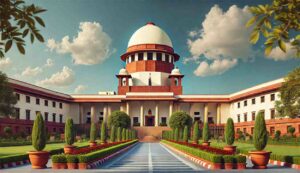The Supreme Court asked the Election Commission to take action against the petitioner seeking implementation of this Act
On Monday, the Supreme Court instructed the petitioner who filed a Public Interest Litigation (PIL) to first file a complaint with the Election Commission of India (ECI) before applying the Sexual Harassment of Women at Workplace (Prevention, Prohibition, and Redressal) Act, 2013 (PoSH Act) to political parties nationwide.

The ECI, which is in charge of registering and regulating political parties, is the proper body to handle the issue, according to a bench comprising justices Surya Kant and Manmohan.
In support of petitioner Yogamaya MG, senior attorney Shobha Gupta concurred with the court and said that her client will seek the ECI. According to the bench, the petitioner may seek redress from an appropriate legal venue if the issue is not remedied.
“The petition is dismissed, and the petitioner is free to contact the appropriate authorities. The bench said in its ruling that the petitioner would be free to seek a court in line with the law if her complaint was not adequately resolved.
Among the parties named as respondents in the petition are the Indian National Congress, Bharatiya Janata Party, Communist Party of India (Marxist), Communist Party of India, All India Trinamool Congress, Nationalist Congress Party, Nationalist People’s Party, Aam Aadmi Party, and Bahujan Samaj Party.
The plea has brought attention to political parties’ violations of the Act, namely with regard to the establishment of Internal allegations Committees (ICCs) to handle allegations of sexual harassment.
It requested guidance that all political parties establish ICCs in accordance with Section 4 of the PoSH Act, 2013 and state that members of political parties are considered “employees” for the purposes of Section 2(f) of the PoSH Act.
“Direct the Election Commission of India to mandate compliance with the PoSH Act as a prerequisite for political parties’ registration and recognition under the Representation of the People Act, 1951,” the petition said.





